
New School of Architecture from the new studio of FA CTU
Interview with David Kraus and Josef Čančík
After winning the competition for the head of the studio, you began teaching at the Faculty of Architecture of the Czech Technical University in Prague in October of last year. You studied at the school yourself from 1989 to 1996. With what ambition did you return to the faculty as an educator? And with what ambition did your assistant Josef Čančík come to it?
David Kraus: I went to the school following my experience at UMPRUM, which was a wonderful time. I enjoyed interacting with the students in A1, the process of creating assignments, collaborating with Josef, and seeing people who had energy, weren’t complaining, and were still eager to learn. I would like to have those last two traits at my age, but that is difficult. At the same time, I was aware of the downsides of teaching, namely the complicated and not entirely flexible contact with institutions, time demands, and inadequate pay. So I said to myself, you are 45, when if not now, because I think that by the time I’m sixty, I will want to do other things.
Josef Čančík: For me, the FA was an unknown environment that I only knew from the perspective of a visitor and from the stories of friends familiar with it. My world was a different school that had been established in my family for three generations. I graduated from UMPRUM and co-led studio A1 for six years. As an obvious "outsider," I might be beneficial to students at FA. Of course, I expect that stepping out of the safety of the known will bring new experiences for me as well.
Does teaching meet your expectations of architectural education?
D.K.: Partially, the system is certainly well-developed, thought up, and tested by many people. However, what I lack is simplicity of thought and a striving for versatility - and I don't mean just constructions, urbanism, or details, I mean human versatility. In music schools, one plays, in sports schools, one runs, and in architecture, one solves architecture. The result is specialists, robots willing to adapt and patiently work for society without seeking otherness. For myself as a person, I seek something different; the result of my lifelong endeavors should not be Kraus - the architect, but Kraus - the human being, a being who designs a bit, runs a bit, draws a bit, sings a bit, observes, perceives, and lazes around.... Another surprise for me is the resignation of students to the state of the world. If I recall my own studies, we were greater revolutionaries - not by what we designed, but by what we did outside the school, how we perceived teachers, studies, and the system as a whole, how we experienced things, how we criticized, how we pushed each other, how we were in opposition, how we were poor. When I was doing my diploma, I was just doing my diploma, dating Petra, and listening to Future Sound of London, that was it. I would simplify, reduce, concentrate, and above all, not measure everything by architecture. In my next life, I will be a carpenter or a truck driver, and the fact that I worked hard as an architect only means how much I haven't seen and felt in this life.
J.Č.: After just one semester, I cannot claim that I have deeply grasped the educational concept of FA. I am only discovering the mechanisms and technical tools that the school operates with, sometimes with astonishment. In students, I would most like to find their personal specific passion for the matter. I would help them carve their own path, whether thorny or mossy soft. I often feel that I see signs of resignation, premature fatigue, or the expectation that there is an established way to proceed that is guaranteed to be correct. However, formulas and rules can be dangerous for the development of an architect if one does not possess autonomous critical thinking. On the other hand, in some students, a great drive and courage are evident. They have my admiration.
For the semester project, you assigned the topic of a New Faculty of Architecture. In the brief, you indicated, among other things, that it would not be a provocation: “It is not about confrontation, it is not about provocative criticism of something that functions with the effort and good intentions of all involved here. It is about seeking and presenting possibilities, our own perspectives on the matter, refining opinions, and... of course, primarily their application in the architecture of the building.” Can you specify your motivation for this assignment?
D.K.: Yes, we admit that initially it was a polemic, because we said - this house is so strict, it is so precisely defined what cannot be done here. Why? There are many examples of schools where you can feel that student energy, that elemental force. However, provocation is scarce; we rejected that and looked for another assignment. Then we discovered that this assignment means asking how the place where you learn affects you. And primarily, it means searching for other models of teaching - not buildings, because they don't matter since they will all disappear one day, but rather systems, environments, rules, and approaches. These inscribe themselves into our minds and are preserved in the form of a common human consciousness forever. It is our collective memory.
J.Č.: It is strange that the topic of personal housing would never spark controversy and is common in schools. However, one’s own house is a difficult topic for an architect. Yet, someone perceives one’s own ideas about education as an attack. It was a difficult topic (perhaps too difficult?) and it could be expected that the outputs would have many shortcomings. However, in a school, one must aim at various targets. And only Baron Münchhausen can bring down all the trophies with a single blow. In response to the assignment “You too design a school of architecture,” everyone ended up with an architectural design. However, their thought constructions rested on diverse foundations and told different stories.
Are you satisfied with the results of the student works? Specifically, did the students’ approach to the task surprise you in any way?
D.K.: The students' approach could overall be more passionate, but from their reactions, I gleaned that they lack life inside the house itself, the possibility to use it, to stick things on the walls, to drill into them, to inhabit atriums, to hold their events here, to be able to sleep here, also to physically touch the material, and during teaching, to be perceived as equal partners. As for the studio - there is always a silent moderate majority, then people who can be motivated - you see how they grow, and then a few chosen ones who have their own opinion, motivate you, are your partners, and are present - literally and in the deepest sense of the word. I am thus half satisfied; on the one hand, we received three nominations for the Lead Dusana, while on the other hand, we ended last in the assessment of studios by the school. There is a contradiction in how your work is perceived from the inside and the outside.
J.Č.: The theme of freedom and appropriation of the school's environment is by no means trivial and should not be swept off the table with reference to “order.” Some variability of the environment dependent on users is a legitimate topic. It would also be great if students could accelerate their work better. Perhaps, however, they simply don’t have enough time in the demanding program for the studio (?).
Have you noted any reactions?
D.K.: We have mostly noted the good ones because in the Czech Republic it is not customary to criticize directly. The only one who told us this directly was Mr. Lábus, for which I am grateful. In some respects, he was right; I disagree with others, but I am certainly thinking about it. At my age, I am not offended so much anymore, my ego is hopefully shrinking, phew. If something bothers me, I primarily look for the problem in myself. Good criticism is a beautiful thing, and it's great when that person also advises how to do it better. We have good feedback from students and some colleagues, and I am particularly grateful for the critical comments from students. And it may sound strange, but it is also important what feeling Josef and I personally have from it - I am enjoying it so far; how about you, Josef?
J.Č.: I’m afraid that it is primarily difficult, if not impossible, to maintain the consistency of the studio within the “fluctuating” model of study. I wouldn’t want to fall into the category of a profile studio that you attend just because things are done a certain way there... And the development of the studio is tied to the development of its core students. I don’t know how it will work when they essentially do not exist...
With what motivation do you enter the second semester?
D.K.: To continue, to believe, to make work more effective, and to be generally tougher. I want to learn to teach easily, not to waste time, I want to see better into students' minds, I want to enjoy it, I don’t want to be tired after consultations. If this succeeds, I believe that the students' reactions will also improve, which - as I said - could have been more passionate.
J.Č.: I see early on after the start of the semester that it will not be easy to cultivate the desired “toughness.” I am more of a skeptic than a preacher. In school, I can express my opinion but I can also immediately question it. And I suspect that for an ordinary student, that might not be comfortable...
Josef Choc and Martin Petřík
/students nominated for the best project in the Lead Dusana competition
From the first meeting with David and Josef, we knew that new blood had come to the school. Throughout the semester, they allowed us to work openly and freely. We think this was unusual for many students because such an approach is not a given in other studios. It was up to each of us how to approach the topic and in what manner we wanted to work. However, this entailed individual responsibility, which was also reflected at the end not only in the differing forms of submission but especially in the degree of sophistication. We would highlight particularly how much emphasis David and Josef placed on our personal stories, talents, and characters. Their goal was not to force their approach to architecture upon us at any cost, but to help us find our own stance.
David Kraus: I went to the school following my experience at UMPRUM, which was a wonderful time. I enjoyed interacting with the students in A1, the process of creating assignments, collaborating with Josef, and seeing people who had energy, weren’t complaining, and were still eager to learn. I would like to have those last two traits at my age, but that is difficult. At the same time, I was aware of the downsides of teaching, namely the complicated and not entirely flexible contact with institutions, time demands, and inadequate pay. So I said to myself, you are 45, when if not now, because I think that by the time I’m sixty, I will want to do other things.
Josef Čančík: For me, the FA was an unknown environment that I only knew from the perspective of a visitor and from the stories of friends familiar with it. My world was a different school that had been established in my family for three generations. I graduated from UMPRUM and co-led studio A1 for six years. As an obvious "outsider," I might be beneficial to students at FA. Of course, I expect that stepping out of the safety of the known will bring new experiences for me as well.
Does teaching meet your expectations of architectural education?
D.K.: Partially, the system is certainly well-developed, thought up, and tested by many people. However, what I lack is simplicity of thought and a striving for versatility - and I don't mean just constructions, urbanism, or details, I mean human versatility. In music schools, one plays, in sports schools, one runs, and in architecture, one solves architecture. The result is specialists, robots willing to adapt and patiently work for society without seeking otherness. For myself as a person, I seek something different; the result of my lifelong endeavors should not be Kraus - the architect, but Kraus - the human being, a being who designs a bit, runs a bit, draws a bit, sings a bit, observes, perceives, and lazes around.... Another surprise for me is the resignation of students to the state of the world. If I recall my own studies, we were greater revolutionaries - not by what we designed, but by what we did outside the school, how we perceived teachers, studies, and the system as a whole, how we experienced things, how we criticized, how we pushed each other, how we were in opposition, how we were poor. When I was doing my diploma, I was just doing my diploma, dating Petra, and listening to Future Sound of London, that was it. I would simplify, reduce, concentrate, and above all, not measure everything by architecture. In my next life, I will be a carpenter or a truck driver, and the fact that I worked hard as an architect only means how much I haven't seen and felt in this life.
J.Č.: After just one semester, I cannot claim that I have deeply grasped the educational concept of FA. I am only discovering the mechanisms and technical tools that the school operates with, sometimes with astonishment. In students, I would most like to find their personal specific passion for the matter. I would help them carve their own path, whether thorny or mossy soft. I often feel that I see signs of resignation, premature fatigue, or the expectation that there is an established way to proceed that is guaranteed to be correct. However, formulas and rules can be dangerous for the development of an architect if one does not possess autonomous critical thinking. On the other hand, in some students, a great drive and courage are evident. They have my admiration.
For the semester project, you assigned the topic of a New Faculty of Architecture. In the brief, you indicated, among other things, that it would not be a provocation: “It is not about confrontation, it is not about provocative criticism of something that functions with the effort and good intentions of all involved here. It is about seeking and presenting possibilities, our own perspectives on the matter, refining opinions, and... of course, primarily their application in the architecture of the building.” Can you specify your motivation for this assignment?
D.K.: Yes, we admit that initially it was a polemic, because we said - this house is so strict, it is so precisely defined what cannot be done here. Why? There are many examples of schools where you can feel that student energy, that elemental force. However, provocation is scarce; we rejected that and looked for another assignment. Then we discovered that this assignment means asking how the place where you learn affects you. And primarily, it means searching for other models of teaching - not buildings, because they don't matter since they will all disappear one day, but rather systems, environments, rules, and approaches. These inscribe themselves into our minds and are preserved in the form of a common human consciousness forever. It is our collective memory.
J.Č.: It is strange that the topic of personal housing would never spark controversy and is common in schools. However, one’s own house is a difficult topic for an architect. Yet, someone perceives one’s own ideas about education as an attack. It was a difficult topic (perhaps too difficult?) and it could be expected that the outputs would have many shortcomings. However, in a school, one must aim at various targets. And only Baron Münchhausen can bring down all the trophies with a single blow. In response to the assignment “You too design a school of architecture,” everyone ended up with an architectural design. However, their thought constructions rested on diverse foundations and told different stories.
Are you satisfied with the results of the student works? Specifically, did the students’ approach to the task surprise you in any way?
D.K.: The students' approach could overall be more passionate, but from their reactions, I gleaned that they lack life inside the house itself, the possibility to use it, to stick things on the walls, to drill into them, to inhabit atriums, to hold their events here, to be able to sleep here, also to physically touch the material, and during teaching, to be perceived as equal partners. As for the studio - there is always a silent moderate majority, then people who can be motivated - you see how they grow, and then a few chosen ones who have their own opinion, motivate you, are your partners, and are present - literally and in the deepest sense of the word. I am thus half satisfied; on the one hand, we received three nominations for the Lead Dusana, while on the other hand, we ended last in the assessment of studios by the school. There is a contradiction in how your work is perceived from the inside and the outside.
J.Č.: The theme of freedom and appropriation of the school's environment is by no means trivial and should not be swept off the table with reference to “order.” Some variability of the environment dependent on users is a legitimate topic. It would also be great if students could accelerate their work better. Perhaps, however, they simply don’t have enough time in the demanding program for the studio (?).
Have you noted any reactions?
D.K.: We have mostly noted the good ones because in the Czech Republic it is not customary to criticize directly. The only one who told us this directly was Mr. Lábus, for which I am grateful. In some respects, he was right; I disagree with others, but I am certainly thinking about it. At my age, I am not offended so much anymore, my ego is hopefully shrinking, phew. If something bothers me, I primarily look for the problem in myself. Good criticism is a beautiful thing, and it's great when that person also advises how to do it better. We have good feedback from students and some colleagues, and I am particularly grateful for the critical comments from students. And it may sound strange, but it is also important what feeling Josef and I personally have from it - I am enjoying it so far; how about you, Josef?
J.Č.: I’m afraid that it is primarily difficult, if not impossible, to maintain the consistency of the studio within the “fluctuating” model of study. I wouldn’t want to fall into the category of a profile studio that you attend just because things are done a certain way there... And the development of the studio is tied to the development of its core students. I don’t know how it will work when they essentially do not exist...
With what motivation do you enter the second semester?
D.K.: To continue, to believe, to make work more effective, and to be generally tougher. I want to learn to teach easily, not to waste time, I want to see better into students' minds, I want to enjoy it, I don’t want to be tired after consultations. If this succeeds, I believe that the students' reactions will also improve, which - as I said - could have been more passionate.
J.Č.: I see early on after the start of the semester that it will not be easy to cultivate the desired “toughness.” I am more of a skeptic than a preacher. In school, I can express my opinion but I can also immediately question it. And I suspect that for an ordinary student, that might not be comfortable...
Thank you for the interview.
Josef Choc and Martin Petřík
/students nominated for the best project in the Lead Dusana competition
From the first meeting with David and Josef, we knew that new blood had come to the school. Throughout the semester, they allowed us to work openly and freely. We think this was unusual for many students because such an approach is not a given in other studios. It was up to each of us how to approach the topic and in what manner we wanted to work. However, this entailed individual responsibility, which was also reflected at the end not only in the differing forms of submission but especially in the degree of sophistication. We would highlight particularly how much emphasis David and Josef placed on our personal stories, talents, and characters. Their goal was not to force their approach to architecture upon us at any cost, but to help us find our own stance.
The English translation is powered by AI tool. Switch to Czech to view the original text source.
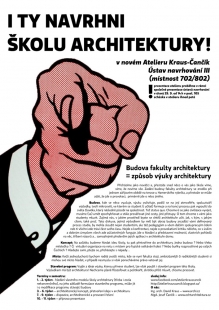
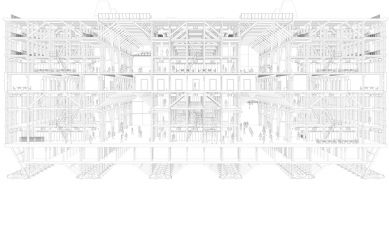
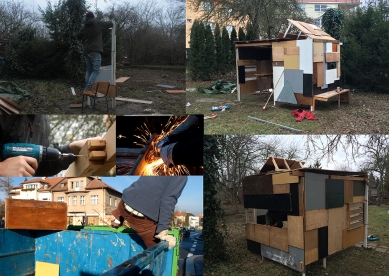
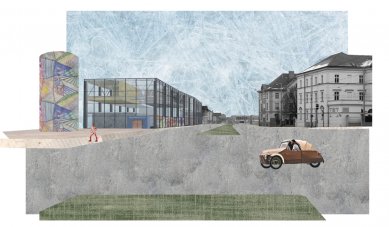
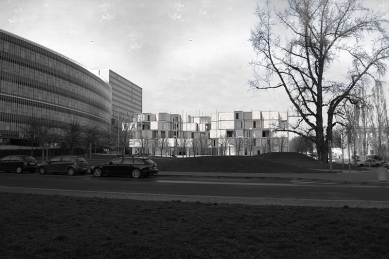
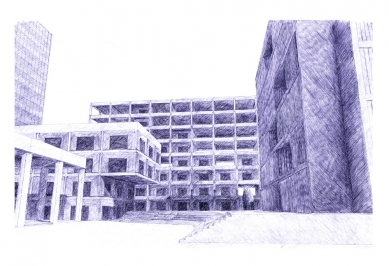
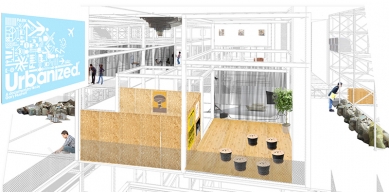

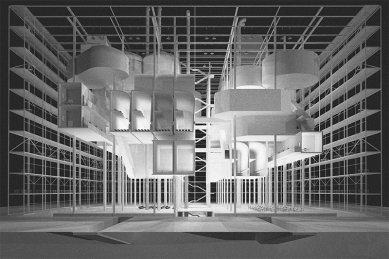
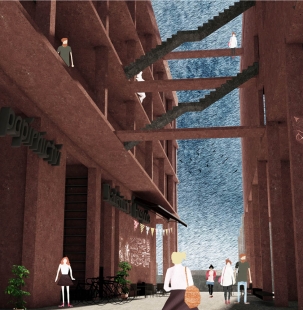
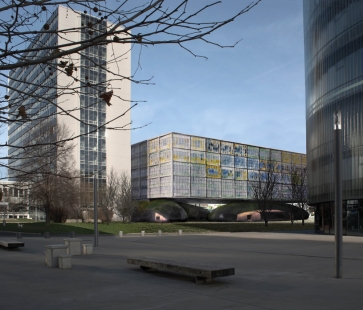
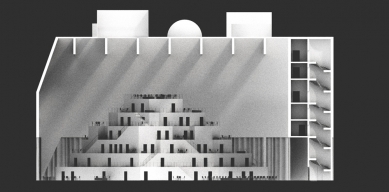
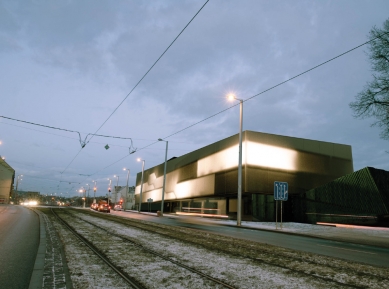
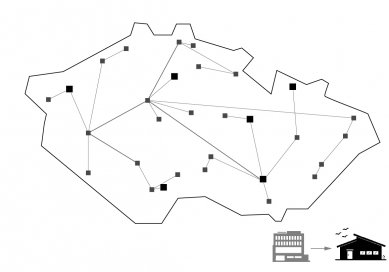
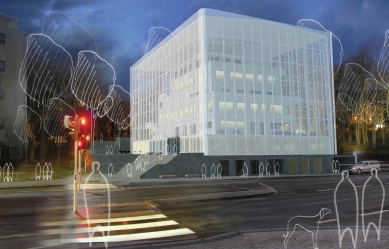
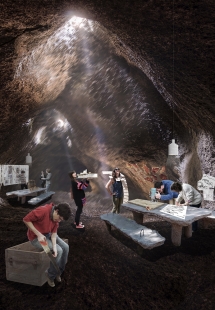
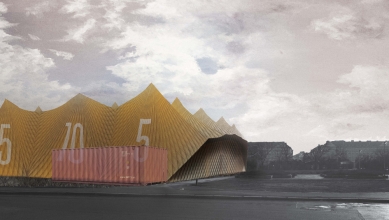
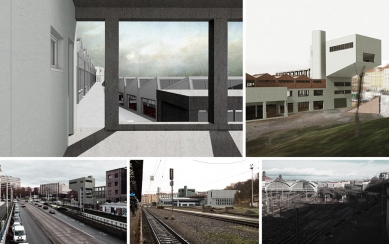
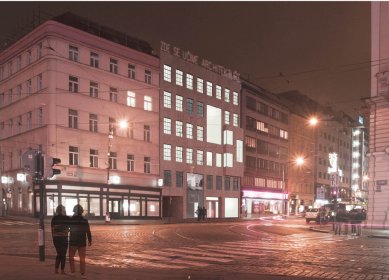

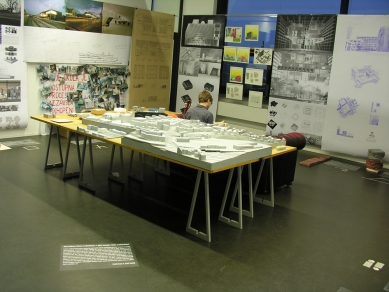
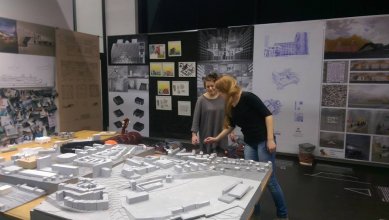
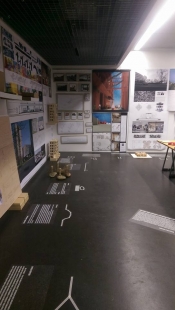
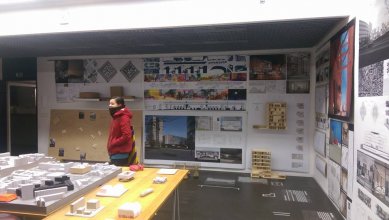
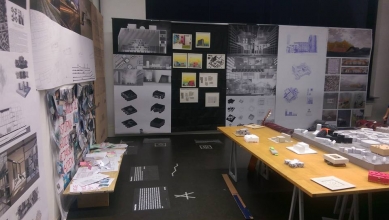

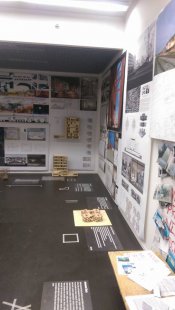
0 comments
add comment











